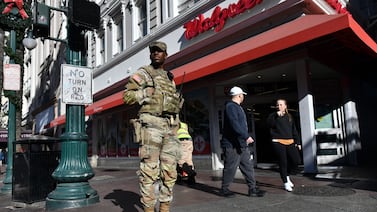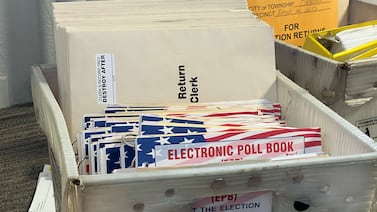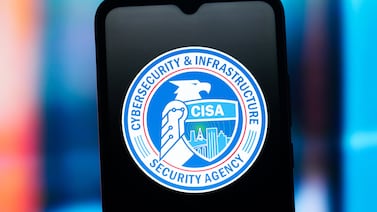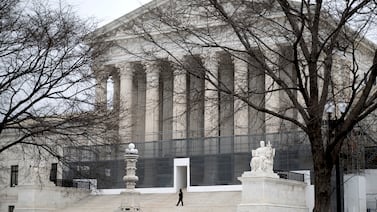Votebeat is a nonprofit news organization reporting on voting access and election administration across the U.S. Sign up for Votebeat Michigan’s free newsletter here.
Michigan shared a limited piece of the state’s voter roll with the U.S. Justice Department on Tuesday, arguing that sharing any personally identifying information would violate several state and federal laws.
The transfer of data in response to two DOJ requests for the qualified voter file followed a brief delay while Michigan Department of State officials wondered how to securely share the information with the federal government.
“While Michigan will provide QVF voter data, some specific data you request is exempt from disclosure under Michigan Election Law,” Khyla Craine, MDOS’s chief legal officer, wrote in the response letter included with the rolls.
The Justice Department’s initial letter to Michigan requested the voter rolls, a list of election officials responsible for maintaining them, and answers to several questions about the state’s response to a survey conducted by the U.S. Election Assistance Commission. A subsequent request from the DOJ asked that the rolls also include information such as Social Security numbers.
Additional responses to other questions are forthcoming, Crain wrote.
Crain’s letter explains that sharing personal identifying information would violate the Privacy Act of 1974 and the Driver Privacy Protection Act, two federal laws that dictate how data requested by the federal government can be collected and shared.
The Justice Department did not immediately respond to a request for comment from Votebeat.
MDOS was able to finally share its roll of more than 8 million voters through the DOJ’s secure file-sharing system, called Justice Enterprise File Sharing system, or JEFS. The system is housed on Box, a commercial file-sharing website. It specializes in secure collaboration, according to the website’s main page.
To share information, MDOS needed federal officials to grant it access to the platform. But an email inviting state officials to collaborate on JEFS did not make clear that the invitation was from the federal government, according to images of the message obtained by Votebeat. The message came from “noreply@box.com” and — aside from a small note at the bottom referencing JEFS — it largely resembled an attempt at phishing, or stealing sensitive information.
Angela Benander, spokesperson for MDOS, told Votebeat last week that the DOJ didn’t alert the department in advance that it would send a Box link. That delayed the transfer of files. She added that the department also needed confirmation from the state’s Department of Technology, Budget and Management that using the link complied with state security policies.
“It would be one thing if they sent an email first to say, ‘Look for this email, it will have a box.com link,’” she said. “But instead, they just sent a random email from a random person with no notification at all.”
Michigan was one of several states that received requests for their complete voter rolls as the Justice Department follows through on President Donald Trump’s executive order to prioritize voter roll maintenance. Some states have complied in a limited way, like Michigan — Pennsylvania, for example, made similar legal arguments — while others, such as Maine, rejected the federal government’s request outright.
Several states that responded did not encounter the same issue with the file transfer as Michigan because they used different methods to share their data. The Colorado Secretary of State’s office, for instance, told Votebeat it transmitted the information using its own in-house file sharing system; Florida officials simply mailed a disk with the files to the DOJ, the same way they would share them with anyone who requested the information, a spokesperson for the office said.
Hayley Harding is a reporter for Votebeat based in Michigan. Contact Hayley at hharding@votebeat.org.





